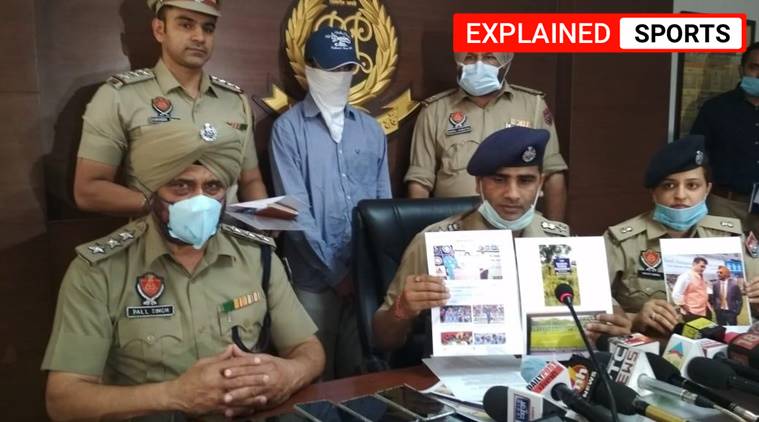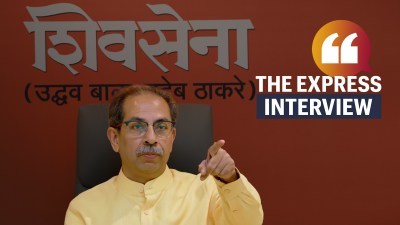- India
- International
Explained: Why it is difficult to prosecute someone accused of match-fixing
Match-fixing is not an independent offence in India and there are no laws covering it.
 Mohali SSP Kuldeep Singh Chahal shows the laptops, mobile phones and documents recovered with Ravinder Singh Dandiwal (in blue shirt) standing behind him. (Express Photo)
Mohali SSP Kuldeep Singh Chahal shows the laptops, mobile phones and documents recovered with Ravinder Singh Dandiwal (in blue shirt) standing behind him. (Express Photo)
On Sunday, the Mohali police arrested alleged match-fixer Ravinder Dandiwal, who has been linked to two betting scandals exposed over the last fortnight.
The first one was uncovered by police in Australia, following which the Sydney Morning Herald described Dandiwal as the ‘kingpin’ of a global match-fixing racket in tennis and cricket. The same person was on the radar of Mohali police for organising a fake Sri Lankan T20 league, whose matches were purportedly held in the island nation but actually played in Sawara, a village near Chandigarh.
Dandiwal has been charged with cheating under Section 420 of the IPC.
Why is he arrested for cheating rather than match-fixing?
Match-fixing is not an independent offence in India and there are no laws covering it. After every match-fixing scandal, investigators, legislators and lawyers have called for reforms, arguing that the absence of laws makes it difficult for them to incriminate someone for match-fixing. Additionally, there is little scope for them to go after those who orchestrate match-fixing, other than the players.
A study by the International Olympic Committee, Interpol and United Nations Office on Drugs and Crime noted: “A criminal justice response against match-fixing would demonstrate that sporting manipulation is not a ‘simple’ breach of sporting rules, but also an offence against the public in a broader sense.”

How, then, have alleged match-fixers been punished in the past?
Those punishments were handed out by the cricket board under its anti-corruption rules and not by law enforcement (these punishments, too, were later reduced or overturned by courts). In fact, lawyers use these cases to illustrate the need to have separate, foolproof laws for match-fixing.
There have been two high-profile match-fixing scandals involving Indian cricketers in the last two decades: the 2000 scam involving former captain Mohammad Azharuddin and the 2013 Indian Premier League spot-fixing controversy, with S Sreesanth at its centre. In both cases, investigators had to fall back on other sections of the law to hold them guilty. In both cases, they were unsuccessful.
 The BCCI uses this photograph of Ravinder Dandiwal (right) in its educational sessions.
The BCCI uses this photograph of Ravinder Dandiwal (right) in its educational sessions.
Last month, Vidhi Legal and the Sport Law and Policy Centre jointly published a paper, ‘Fixing It: Tackling Match Manipulation’. The paper observed that in the 2000 match-fixing scandal, the CBI was unable to register a case against the accused, including Azharuddin, “as it was unable to establish that these cricketers had clearly violated any existing penal legislation in India” even though “their behaviour fell squarely under the ambit of match-fixing as defined by the CBI”.
What is the CBI’s definition of match-fixing?
In its report on the 2000 scandal, the CBI defined match fixing as:
* Instances where an individual player or group of players received money individually/collectively to underperform;
* Instances where a player placed bets in matches in which he played that would naturally undermine his performance;
* Instances where players passed on information to a betting syndicate about team composition, probable result, pitch conditions, weather, etc.;
* Instances where groundsmen were given money to prepare a pitch in a way that suited the betting syndicates; and
* Instances of current and ex-players being used by bookies to gain access to Indian and foreign players to influence their performances for a monetary consideration.
So, under what existing provisions are they charged?
According to senior advocate Vikas Pahwa, who is representing alleged bookie Sanjeev Chawla in the 2000 scandal, investigating authorities mostly try to book the accused for cheating under IPC Section 420.
Last week, Punjab police used this provision to book the organisers of the fake Sri Lankan T20 match. Before that, the Bengaluru Crime Branch chargesheeted players and bookmakers under this section for alleged spot-fixing in the Karnataka Premier League.
Other laws, too, have been used. In 2000, the CBI tried to book Azharuddin under the Prevention of Corruption Act, 1988 as he was a public servant, employed by the State Bank of India (the Act is not applicable to those in the private sector). But it was pointed out that the alleged act of corruption was not committed while he was on duty.
In the IPL spot-fixing scandal, the Mumbai Police charged Sreesanth under the Maharashtra Control of Organised Crime Act (MCOCA), 1999. Here, too, a Delhi court let Sreesanth off for lack of evidence.
What powers do the investigators have?
According to Pahwa, “they have enough power to call anyone, to interrogate anyone, to call for bank statements or call records from service providers… so they have all the powers to collect evidence provided it is available. But there has to be an offence to investigate. Since match-fixing is not defined as an offence, it is difficult to bring it under the domain of Section 420 of the IPC.”
Does the BCCI’s Anti-Corruption Unit have similar powers?
In an interview to The Indian Express recently, the head of BCCI’s ACU, Ajit Singh, said they are a “non-enforcement agency”. “We can request him (to come for questioning). If he comes, fine, but if he does not, there is little we can do. Also (without a law), police will be able to only question him if he has committed a crime. That is why we say we need a match-fixing law,” Singh had said.
Have there been attempts to make laws against match-fixing?
Yes. In 2013, the Sports Ministry drafted the Prevention of Sporting Fraud Bill, which suggested a jail term for offenders. That Bill has died a slow death.
Two Private Member’s Bills too were introduced in the Lok Sabha, one by Anurag Thakur (National Sports Ethics Commission Bill) in 2016 and the other by Shashi Tharoor — The Sports (Online Gaming and Prevention of Fraud) Bill – in 2018. Neither has been debated yet.
More Explained
EXPRESS OPINION
Apr 20: Latest News
- 01
- 02
- 03
- 04
- 05









































